Antarctica Blog – 15 March 2009
Posted in Comment on 03/15/2009 09:02 am by Stephen TindaleBeagle Passage, Argentina. Today was a perfect day for walking – light cloud and much less wind than yesterday. We set off, straight after breakfast, to walk up to the place where there used to be a glacier.
We started up a track, which is normally a ski slope, but which doesn’t yet have snow this year. When we reached the current snowline, the temperature was below freezing, so the ascent was more like vertical ice skating than walking! But, it was worth it for the spectacular views into the corrie and back across the Beagle Channel.
 However, the results of climate change are all-too-obvious. This picture is taken from the terminal moraine looking up the valley and into the corrie. At the top of the valley, there is a shallow covering of snow, but absolutely no glacier. Too many people think of climate change as a future issue – will it happen and, if so, what will the consequences be? But it is happening now, and the consequences are serious. Melting glaciers mean rising sea levels and also water shortages for areas where rivers are fed by glaciers, such as much of South Asia.
However, the results of climate change are all-too-obvious. This picture is taken from the terminal moraine looking up the valley and into the corrie. At the top of the valley, there is a shallow covering of snow, but absolutely no glacier. Too many people think of climate change as a future issue – will it happen and, if so, what will the consequences be? But it is happening now, and the consequences are serious. Melting glaciers mean rising sea levels and also water shortages for areas where rivers are fed by glaciers, such as much of South Asia.
And yet I came down from the walk feeling more positive about our chances of controlling climate change – the result of optimistic conversations with my fellow walkers. One was with a Pakistani man during which we discussed the scope for wind, hydro and solar power in Pakistan. Another was with a Chinese woman about the massive public demand in her country for action on climate change. Climate change is a truly global issue – it doesn’t matter to world climate where greenhouse gases are emitted. This is unlike air pollutants, such as sulphur dioxide, high concentrations of which damage human health on a local basis. So the rich world should also invest heavily in renewable energy in the developing world and not just closer to home. It is worth remembering that solar, wind and biomass energy resources are immense. And, as well as climate benefits, clean energy will have enormous social benefits. For example, around a million Indians die every year from indoor air pollution caused by using dirty fuel for cooking.
Tomorrow, we board the ship to set off for the Antarctic Peninsula, crossing Drake’s Passage, one of the roughest seas in the world. We’re expecting to be seasick, but are all extremely excited to be heading even further south …

